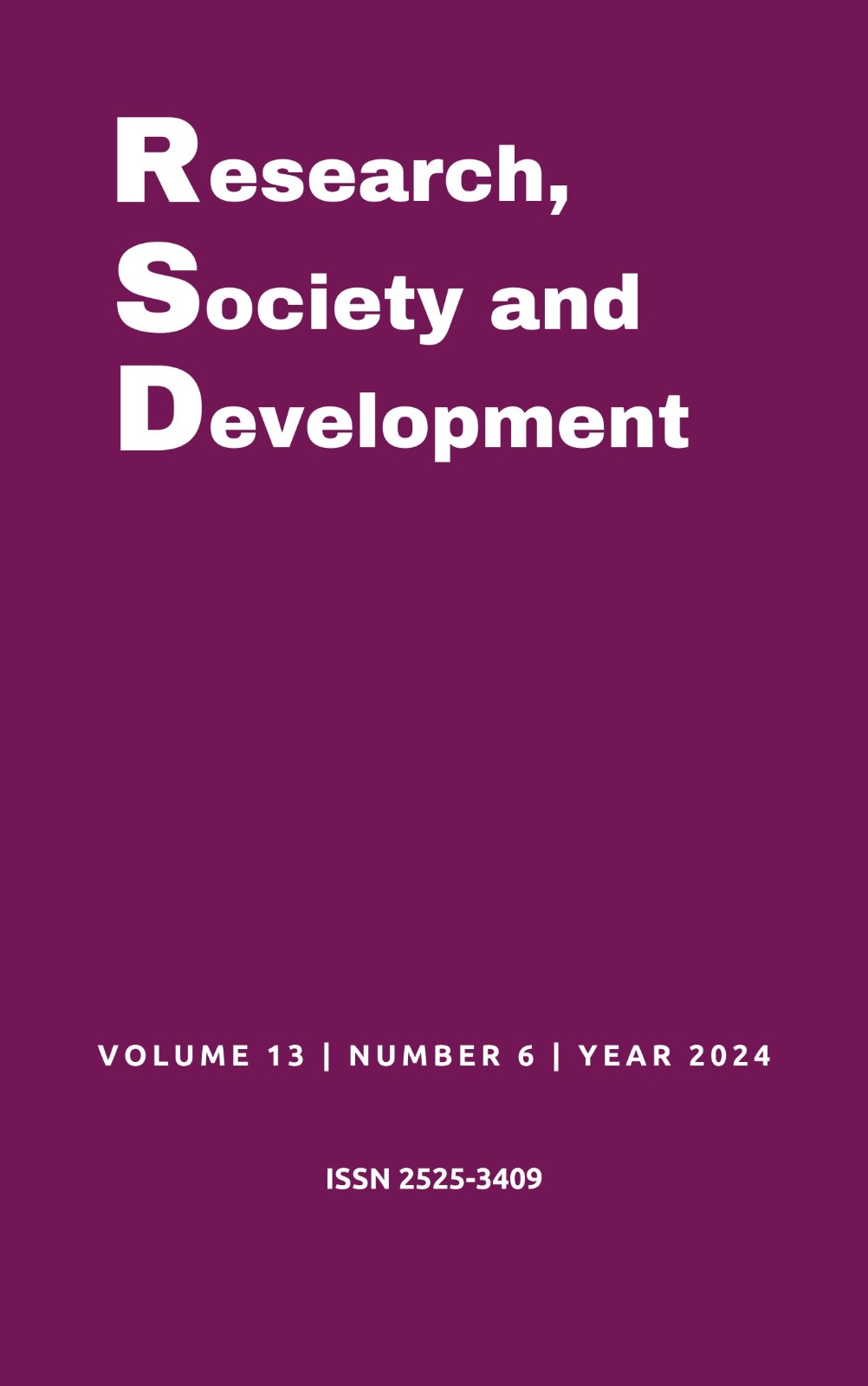A relação entre a cirurgia bariátrica e os transtornos mentais: Uma análise
DOI:
https://doi.org/10.33448/rsd-v13i6.46015Palavras-chave:
Saúde mental, Cirurgia bariátrica, Ansiedade, Depressão.Resumo
Objetivo: descrever a relação entre a cirurgia bariátrica e os transtornos mentais, como a ansiedade e a depressão. Materiais e Métodos: Trata-se de uma revisão bibliográfica qualitativa e narrativa em bases de dados acadêmicas da SciELO, PubMed e Google Acadêmico, buscando estudos e documentos recentes sobre a relação entre cirurgia bariátrica e transtornos mentais. Resultados e Discussão: A cirurgia bariátrica é eficaz, porém apresenta riscos e complicações, podendo provocar mudanças rápidas e drásticas no corpo e na vida dos pacientes, que frequentemente sofrem com transtornos mentais antes e após o procedimento. A interação complexa entre obesidade, transtornos mentais e cirurgia bariátrica destaca a importância da abordagem multidisciplinar no tratamento desses pacientes. Conclusão: A compreensão dessa relação complexa é essencial para otimizar resultados clínicos e qualidade de vida pós-operatória. Uma abordagem integral, considerando aspectos físicos, emocionais e psicológicos, é fundamental para o tratamento. Pesquisa contínua e intervenções inovadoras são necessárias para melhorar o cuidado e os resultados dos pacientes submetidos a cirurgia bariátrica.
Referências
ABESO - Associação Brasileira para o Estudo da Obesidade e da Síndrome Metabólica. Mapa da obesidade. https://abeso.org.br/obesidade-e-sindrome-metabolica/mapa-da-obesidade
Alves, B. O. M. Cirurgia bariátrica (cirurgia de redução do estômago) | Biblioteca Virtual em Saúde MS. https://bvsms.saude.gov.br/cirurgia-bariatica
American Psychiatric Association. (2013). Diagnostic and statistical manual of mental disorders (5th ed.). Arlington, VA: American Psychiatric Publishing.
American Psychiatric Association, et al. (2014). DSM-5: Manual diagnóstico e estatístico de transtornos mentais. Porto Alegre: Artmed Editora.
Bergmann, N. C., Davies, M. J., Lingvay, I., & Knop, F. K. (2022, October 18). Semaglutide for the treatment of overweight and obesity: A review. Diabetes, Obesity and Metabolism, 25(1).
Bringel Neto, L. L. (2021). Transtornos mentais em pacientes submetidos à cirurgia bariátrica: revisão integrativa de literatura. Surgery for Obesity and Related Diseases, 12(5), 45-67.
Calderone, A., Calabro, P. F., Lippi, C., Jaccheri, R., Vitti, J., & Santini, F. (2017). Comportamento psicopatológico e cognição na obesidade mórbida. Recent Patents on Endocrine, Metabolic & Immune Drug Discovery, 10, 112-118.
Castanha, C. R., et al. (2018). Avaliação da qualidade de vida, perda de peso e comorbidades de pacientes submetidos à cirurgia bariátrica. Revista do Colégio Brasileiro de Cirurgiões, 45(3), e1864. https://doi.org/10.1590/0100-6991e-20181864
Mata, M. D., et al. (2024). Cirurgia bariátrica: padrões comportamentais e transtornos da personalidade no pré-operatório. Revista Cuidarte, 15(1), página inicial-página final. https://doi.org/10.15649/cuidarte.2240
Magalhães, B. (2020). Determinantes do sucesso da cirurgia bariátrica [Determinants of success in bariatric surgery]. https://repositorio-aberto.up.pt/bitstream/10216/129750/2/426895.pdf
Ministério da Saúde (BR). (2021). Cirurgia bariátrica. https://bvsms.saude.gov.br/cirurgia-bariatica
Oliveira, C. B. C., Brito, L. A., Freitas, M. A., Souza, M. P. A., Rêgo, J. M. C., & Machado, R. J. A. (2020). Obesidade: inflamação e compostos bioativos. J Health Biol Sci, 8(1), 1-5.
Pezzim, I. M., et al. (2020). Ansiedade contribui para o aumento do grau de dependência da assistência de enfermagem no pós-operatório imediato de cirurgia bariátrica. REME-Revista Mineira de Enfermagem, 24(1), páginas iniciais-finais. https://doi.org/10.5935/1415.2762.20200084
Picanço Jr., A. P. (2020). Protocolo de manejo pré e pós-operatório em cirurgia bariátrica do Hospital Universitário Getúlio Vargas – HUGV- EBSERH (Dissertação de mestrado em Cirurgia). Universidade Federal do Amazonas, Manaus (AM).
Prando, C. B., Bernardes, A. B., Libório, A. N. P., Rossoni, E. L., & Ramos, I. S. (2023). Desenvolvimento de ansiedade e depressão a partir do sobrepeso e da obesidade. Brazilian Journal of Health Review, 6(2), 5656-5665. https://ojs.brazilianjournals.com.br/ojs/index.php/BJHR/article/view/58148/42390
Reis, M. M., & Júnior, L. A. C. (2023). Prevalência de transtornos psiquiátricos após cirurgia bariátrica: uma revisão da literatura. Debates em Psiquiatria, 13, 1-15.
Rocha, M. E. S. B., et al. (2023). Transtornos psiquiátricos associados à cirurgia bariátrica e seus desafios no século XXI. Brazilian Journal of Implantology and Health Sciences, 5(5), 4479-4492.
Rother, E. T. (2007). Revisão sistemática x revisão narrativa. Acta Paulista de Enfermagem, 20(2). https://doi.org/10.1590/S0103-21002007000200001
Sierżantowicz, Ladny, Lewko (2022). Qualidade de vida após cirurgia bariátrica - uma revisão sistemática. International Journal of Environmental Research and Public Health, 19(15), 9078. https://doi.org/10.3390/ijerph19159078
Sociedade Brasileira de Cirurgia Bariátrica e Metabólica (SBCBM). (2017). Cirurgia bariátrica - técnicas cirúrgicas [Internet]. https://www.sbcbm.org.br/tecnicas-cirurgicas-bariatrica
Snyder, H. (2019). Literature review as a research methodology: An overview and guidelines. Journal of Business Research, 104, 333-339.
Tarozo, M., & Pessa, R. P. (2020). Impacto das consequências psicossociais do estigma do peso no tratamento da obesidade: uma revisão integrativa da literatura. Psicologia: Ciência e Profissão, 40, e190910. https://doi.org/10.1590/1982-3703003190910
Wanderley, E. N., & Ferreira, V. A. (2010). Obesidade: uma perspectiva plural. Ciência & Saúde Coletiva, 15(1). https://doi.org/10.1590/S1413-81232010000100024
Rother, E. T. (2007). Revisão sistemática x revisão narrativa. Acta paul. enferm. 20 (2). https://doi.org/10.1590/S0103-21002007000200001.
Downloads
Publicado
Edição
Seção
Licença
Copyright (c) 2024 Beatriz Carvalho Rotella; Marcela Raffoul Domingos Guimarães Xavier; Jorge Tostes

Este trabalho está licenciado sob uma licença Creative Commons Attribution 4.0 International License.
Autores que publicam nesta revista concordam com os seguintes termos:
1) Autores mantém os direitos autorais e concedem à revista o direito de primeira publicação, com o trabalho simultaneamente licenciado sob a Licença Creative Commons Attribution que permite o compartilhamento do trabalho com reconhecimento da autoria e publicação inicial nesta revista.
2) Autores têm autorização para assumir contratos adicionais separadamente, para distribuição não-exclusiva da versão do trabalho publicada nesta revista (ex.: publicar em repositório institucional ou como capítulo de livro), com reconhecimento de autoria e publicação inicial nesta revista.
3) Autores têm permissão e são estimulados a publicar e distribuir seu trabalho online (ex.: em repositórios institucionais ou na sua página pessoal) a qualquer ponto antes ou durante o processo editorial, já que isso pode gerar alterações produtivas, bem como aumentar o impacto e a citação do trabalho publicado.


